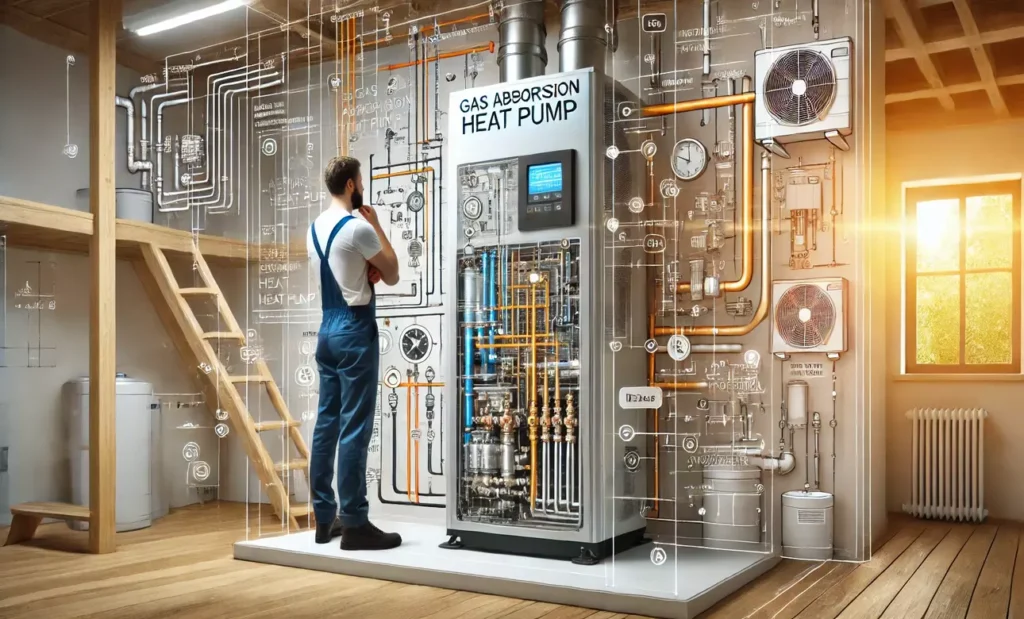Gas Absorption Heat Pumps: The Future of Efficient Heating

Have you ever wondered if there’s a way to heat your home or business that’s both eco-friendly and cost-effective? Enter the gas absorption heat pump—a game-changing technology revolutionizing our thoughts about heating. This article will explore how they work, their benefits, and why they might be the perfect solution for your heating needs.
- Introduction to Gas Absorption Heat Pumps
- How Gas Absorption Heat Pumps Work
- Advantages of Gas Absorption Heat Pumps
- Applications of Gas Absorption Heat Pumps
- Comparing Gas Absorption Heat Pumps to Other Heating Systems
- Cost Considerations
- Environmental Impact and Sustainability
- Future Trends in Gas Absorption Heat Pump Technology
- Choosing the Right Gas Absorption Heat Pump
- Case Studies: Success Stories
- Challenges and Limitations
- Government Incentives and Rebates
- Frequently Asked Questions (FAQs)
- Conclusion: Is a Gas Absorption Heat Pump Right for You?
Introduction to Gas Absorption Heat Pumps
Gas absorption heat pumps (GAHPs) are not just another heating system. They represent a major leap forward in heating technology, leveraging the energy of natural gas or propane to power an innovative refrigeration cycle. Unlike traditional heat pumps that rely on electricity, GAHPs use thermal energy to provide efficient heating and cooling. They’re the cutting-edge solution you’ve been waiting for, and their unique features will pique your interest.
How Gas Absorption Heat Pumps Work
The Absorption Cycle
The magic of GAHPs lies in their unique absorption cycle. Imagine a merry-go-round of heat transfer, where energy constantly moves and transforms. Here’s a simplified breakdown:
- A mixture of refrigerant (usually ammonia) and absorbent (often water) is heated by natural gas.
- The refrigerant vaporizes and separates from the absorbent.
- The refrigerant vapor moves to a condenser, releasing heat and turning back into a liquid.
- The refrigerant, now in liquid form, then passes through an expansion valve., which cools it down even more.
- In the evaporator, the cold refrigerant absorbs heat from the surroundings. The refrigerant vapor is then reabsorbed into the absorbent, completing the cycle.
Key Components
A GAHP system consists of several crucial parts:
- Generator: Where the refrigerant-absorbent mixture is heated
- Condenser: In the condenser, heat is removed from the refrigerant, causing it to condense and return to a liquid form
- Evaporator: In this part, the refrigerant absorbs heat from the surrounding environment, causing it to evaporate
- Absorber: Where the refrigerant vapor is reabsorbed into the absorbent
- Heat exchanger: Improves efficiency by preheating the solution
Advantages of Gas Absorption Heat Pumps
Energy Efficiency
One of the most exciting aspects of GAHPs is their incredible efficiency. When we say a GAHP is over 140% efficient, we mean it produces more usable energy than the gas energy it consumes. This translates to significant cost savings, making them a wise investment for your home or business.
Environmental Benefits
While GAHPs use natural gas, they’re significantly more environmentally friendly than traditional heating systems. They generate less greenhouse gas emissions and can be powered by renewable natural gas, making them a sustainable choice for your heating needs. Choosing a GAHP is not just a wise decision for your pocket but also a responsible one for the environment, making you proud of your choice.
Cost Savings
Who doesn’t love saving money? Gas absorption heat pumps can substantially lower heating expenses, particularly in regions where natural gas is more cost-effective than electricity. Over time, these savings can add up, making your wallet and the planet happy.
Applications of Gas Absorption Heat Pumps
Residential Use
GAHPs are great for homes but are significantly larger and have high heating demands. They can provide space heating and hot water, making them versatile for residential properties.
Commercial and Industrial Applications
These powerhouses shine in commercial and industrial settings. GAHPs can efficiently heat large spaces and provide process heat for various applications, from hotels to hospitals to factories and warehouses.
Comparing Gas Absorption Heat Pumps to Other Heating Systems
vs. Traditional Gas Boilers
GAHPs are much more efficient than conventional gas boilers. While a high-efficiency gas boiler might achieve 95% efficiency, a GAHP can surpass 140%. That’s like turning your heating system into an overachiever.
vs. Electric Heat Pumps
Electric heat pumps are another efficient option, but GAHPs have some advantages. They perform better in colder climates and achieve higher water temperatures, making them ideal for retrofitting older buildings with existing radiator systems.
Installation and Maintenance
Installation Process
Installing a GAHP isn’t a DIY project – it requires professional expertise. The process typically involves:
- Site assessment
- System sizing
- Installation of the heat pump unit
- Connection to gas and water systems
- Installation of distribution systems (radiators, underfloor heating, etc.)
- Commissioning and testing
Maintenance Requirements
Like any heating system, GAHPs need regular TLC to keep running smoothly. Annual maintenance checks, filter replacements, and occasional refrigerant top-ups are needed to keep your GAHP humming happily.
Cost Considerations
Initial Investment
GAHPs aren’t the cheapest option upfront. While gas absorption heat pumps may have a higher initial cost as compared to traditional heating systems, the long-term energy savings can often justify the investment. However, it’s essential to consider them an investment rather than an expense.
Long-term Savings
Here’s where GAHPs shine. The energy cost savings from using a gas absorption heat pump can be significant, often recovering the initial investment in just a few years. With GAHPs, you’re not just saving money on your heating bills-you’re making a wise, long-term investment in your home or business, giving you confidence in your financial planning.
Environmental Impact and Sustainability
GAHPs are a step toward a greener future. By using natural gas more efficiently and potentially incorporating renewable gas sources, they offer a bridge technology to more sustainable heating solutions.
Future Trends in Gas Absorption Heat Pump Technology
The future looks bright for GAHP technology. Researchers are improving efficiency, reducing costs, and exploring new refrigerant-absorbent pairs. We might even see hybrid systems that combine GAHPs with other renewable technologies.
Choosing the Right Gas Absorption Heat Pump
Selecting the right GAHP for your needs is crucial. Consider factors like:
- Your heating and cooling requirements
- Available space for installation
- Local climate conditions
- Gas and electricity prices in your area
- Your budget and long-term energy goals
Case Studies: Success Stories
Let’s look at some real-world examples:
- A hotel in Scotland reduced its heating costs by 40% after installing a GAHP system.
- A large residential complex in Germany achieved 30% energy savings compared to its previous heating system.
- An industrial facility in Canada used GAHPs to provide space heating and process heat, reducing their energy consumption by 35%.
Challenges and Limitations
While GAHPs offer many benefits, they’re not without challenges:
- Higher upfront costs
- Need for professional installation and maintenance
- Dependence on natural gas infrastructure
- Limited awareness and availability in some regions
Government Incentives and Rebates
Many governments offer incentives for installing energy-efficient heating systems like GAHPs. These can include tax credits, rebates, or low-interest loans. Check with your local energy authority to see what’s available in your area.
Frequently Asked Questions (FAQs)
What is a gas absorption heat pump?
A gas absorption heat pump is a heating system that uses natural gas to power an absorption cycle, providing efficient heating and cooling.
How efficient are gas absorption heat pumps?
GAHPs can achieve efficiencies over 140%, producing more usable energy than the gas energy they consume.
Are gas absorption heat pumps environmentally friendly?
While they use natural gas, GAHPs are more environmentally friendly than traditional heating systems due to their high efficiency and lower emissions.
Can gas absorption heat pumps provide cooling as well as heating?
Many GAHP systems can provide heating and cooling, making them versatile year-round solutions.
How do gas absorption heat pumps compare to electric heat pumps?
GAHPs perform better in colder climates and achieve higher water temperatures than electric heat pumps.
What maintenance do gas absorption heat pumps require?
GAHPs typically need annual maintenance checks, filter replacements, and occasional refrigerant top-ups.
Are there government incentives for installing gas absorption heat pumps?
Many governments offer incentives for energy-efficient heating systems like GAHPs. Check with your local energy authority for details.
Can gas absorption heat pumps be used in residential settings?
GAHPs are suitable for residential use, especially in larger homes with high heating demands.
What’s the lifespan of a gas absorption heat pump?
A GAHP can last 15-20 years or more with proper maintenance.
Can gas absorption heat pumps work with existing radiator systems?
Yes, GAHPs can achieve high water temperatures, making them suitable for use with existing radiator systems.
Conclusion: Is a Gas Absorption Heat Pump Right for You?
Gas absorption heat pumps offer an exciting solution for efficient, cost-effective heating. While they require a higher initial investment, long-term energy savings, and environmental benefits make them attractive for many homes and businesses.
As with any major investment, carefully evaluating the pros and cons, depending on your unique circumstances, is crucial when considering a gas absorption heat pump. Consider factors like your local climate, energy prices, and heating needs. Consult with heating professionals to determine if a GAHP is the right choice.
Remember, choosing an efficient heating system isn’t just about saving money—it’s about creating a more sustainable future. By opting for technologies like gas absorption heat pumps, we can all help reduce our energy consumption and environmental impact. So, are you ready to embrace the future of heating? A gas absorption heat pump might be the game-changer you’ve been looking for.






